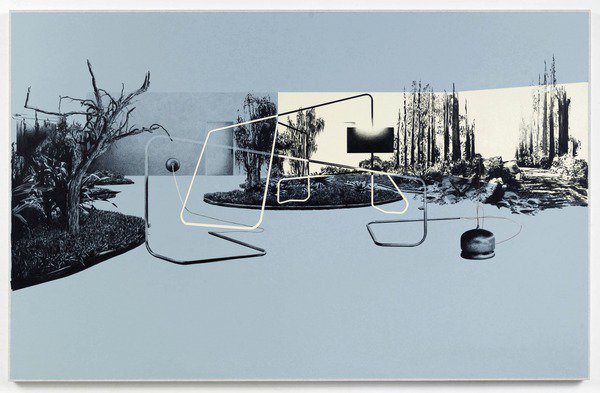24/6/2014
Tatiana Trouve'
Mamco, Geneve
The Longest Echo. The exhibition brings together work that the artist has produced from the mid-1990s to the present day. Although not a retrospective, The Longest Echo is a large selection of works that between them take up the first two floors of the museum, focusing on a number of structuring series.

From 25 June to 21 September 2014 Mamco will present The
Longest Echo/L’Écho le plus long. This exhibition by Tatiana
Trouvé (born in the Italian town of Cosenza in 1968, she now
lives and works in Paris) brings together work that the artist
has produced from the mid-1990s to the present day. Although
not a retrospective, The Longest Echo is a large selection of
works that between them take up the first two floors of the
museum, focusing on a number of structuring series.
Tatiana Trouvé’s work is based on the creation of a space in
tune with the development of psychic phenomena. Its first
component, launched in 1997 and already exhibited at Mamco
in 2004, was the Bureau d’Activités Implicites (BAI) (‘Office of
Implicit Activities’). It has developed in various ‘modules’,
places for work and concentration whose function may be to
produce thoughts or to record the traces of the artist’s activ-
ity – who can tell? This research has continued in Polders,
reduced spaces grafted onto ones that are already there:
enigmatic, combining features that refer to a variety of worlds
(sport, medicine, music and so on), Polders bears the hall-
marks of a dreamlike experience.
Similar exchanges between physical and psychic spaces are
at work in Tatiana Trouvé’s drawings, especially in the Intran-
quillity series, which presents interior architectures whose
strangeness is instantly perceptible: something, someone,
seems to have disappeared or at least be missing, as is made
clear by the arrangement of the places and the coexistence
of the objects. Here, as in her installations, the artist per-
suades us that the reality, the truth of a place cannot be
reduced to what we see of it – that, in their deployments (the
title of another series of drawings) and their folds, spaces are
neither stable nor fixed, but quivering and floating. This exhi-
bition also provides plenty of room for the artist’s graphic
work. On the first-floor Plateau des sculptures, a huge metal
structure invented by Tatiana Trouvé dominates the entire
space and allows some forty large drawings to be exhibited
– the first time that such a structure has been designed and
displayed.
Trouvé thus appears to believe not only that places have an
unconscious, but also that the present space and time are
scarcely more than fragments of a much broader space and
time. Even more marked traces of this can be seen in some of
her most recent work, such as 350 points à l’infini (‘350 points
at infinity’, a disrupted magnetic field with plumb lines point-
ing in different directions), I tempi doppi (‘Double times’, a ste-
reoscopic view of time through two connected light bulbs, one
on, the other off) and I cento titoli (‘The hundred titles’, a
sculpture with a hundred titles, for a hundred years....)
The structure of Tatiana Trouvé’s work resembles the growth
of a world whose components are constantly being redistrib-
uted, distorted, modified and redeployed – for the artist’s work
revolves round the creative forces of memory: memories of
experience, of thoughts, of projects, of forms and so on. What
Trouvé has created here for Mamco, in keeping with the archi-
tectural identity of the place, is a new and broad reflection of
this ever-changing world.
The shadow of the waxwing (after Pale fires)
On the fourth floor, the exhibition The shadow of the waxwing
(after Pale fires), presented during the Philippe Thomas ret-
rospective in the spring, has been extended. In 1990, Philippe
Thomas was invited by CAPC (the Bordeaux Museum of Con-
temporary Art) to design the exhibition Pale fires. Through his
agency readymades belong to everyone®, Thomas saw
this invitation as an opportunity to raise the fictionalist princi-
ple adopted in his previous work to the level of the institution,
a neutral place of scientific knowledge that is not usually sus-
pected of partiality. The shadow of the waxwing presented at
Mamco is not a literal replica of Pale fires – an exercise that
would now be bound to fail – but is designed as an exhibition
in the shadow of the first one.
A hitherto unexhibited set of works will be on display in the
third-floor space devoted to Collections.
Image: Tatiana Trouvé, Untitled from the series Intranquillity, 2011 Photo André Morin
Courtesy of the artist and Johann König, Berlin, Galerie Perrotin, Paris and Gagosian Gallery, New York
Press Office
For all requests, information and visuals, please contact:
Sophie Eigenmann
s.eigenmann@mamco.ch
Tel. + 41 22 320 61 22
Mamco
Musée d’art moderne et contemporain, Genève
10, rue des Vieux-Grenadiers - CH-1205 Genève
The museum is open Tuesday through Friday from noon to
6 p.m., the first Wednesday of the month until 9 p.m., and
Saturday and Sunday from 11 a.m. to 6 p.m. Closed on
Mondays, Friday 1 August and Thursday 11 September
2014.
Regular admission CHF 8.–
Reduced admission CHF 6.–
Group admission CHF 4.–



